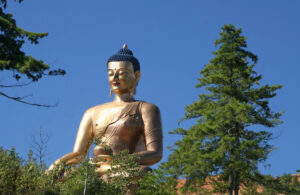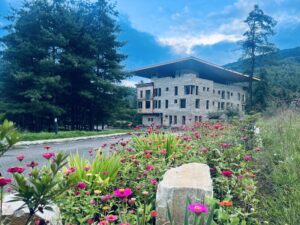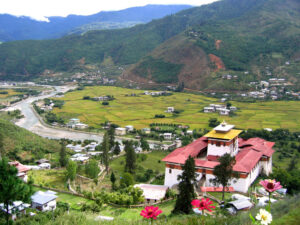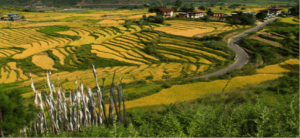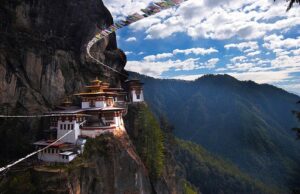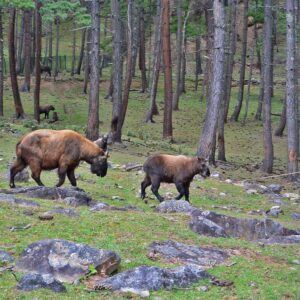Happiness is a Place
A Romantic Journey into the Heart of Bhutan
Welcome to Bhutan, the Land of the Thunder Dragon—a country where time slows down and life is measured not by wealth, but by happiness. Tucked away in the Eastern Himalayas, Bhutan stands as the world’s first carbon-negative nation, a living sanctuary of pristine landscapes, untouched forests, and pure mountain air. Here, Gross National Happiness is not just a philosophy but a way of life, reflected in the compassion, empathy, and warmth of the Bhutanese people.
Guided by a benevolent monarchy and supported by a thriving democratic system admired worldwide, Bhutan seamlessly blends tradition with modern aspirations. Its ancient Dzong fortresses, sacred monasteries, and living museums stand as proud guardians of a cultural heritage like no other. As you wander through bustling markets, join monks in silent prayer, or witness centuries-old festivals, you will discover a country that celebrates spirituality, community, and harmony with nature.
In just a week, Bhutan promises to reveal not only breathtaking Himalayan vistas and vibrant traditions but also a deeper connection—to the land, to the people, and perhaps even to yourself. This is more than a journey; it is a life-changing experience that stays with you long after you have left.
Quick facts
-
Scenic Arrival: Flights to Paro (7,480 ft / 2,280 m) offer breathtaking views of Mt. Everest, Kanchenjunga & Bhutan’s own Mt. Jomolhari.
-
Compact Journey: In just 7 days, visitors experience three districts — Paro, Thimphu, and Punakha — each with unique landscapes and heritage.
-
Cultural Gems: Explore ancient Dzongs, monasteries, and sacred temples dating back to the 7th century.
-
Tiger’s Nest: The iconic Taktsang Monastery (10,240 ft / 3,120 m) hike is ~5 hours round trip, one of the world’s most rewarding pilgrimages.
-
Mountain Passes: Cross Dochula Pass (10,171 ft / 3,100 m), where 108 stupas crown the ridge with 200-mile Himalayan views on clear days.
-
Royal Golf Course: Unique chance to play at one of the world’s most scenic golf courses, in Thimphu at 7,657 ft (2,334 m).
-
Sustainability First: Bhutan is the world’s only carbon-negative country, protecting over 70% forest cover.
-
Gross National Happiness: More than an idea — it guides governance, tourism, and everyday life.
-
Warm Hospitality: Visitors are welcomed with compassion, respect, and genuine curiosity, leaving as friends rather than tourists.
-
Memorable Farewell: Guides and drivers bid guests goodbye with blessings at Paro Airport — a heartfelt tradition that makes departures unforgettable.
Preview the itinerary
DAY 1
Arrival in Paro Bhutan and journey to Thimphu – the capital city
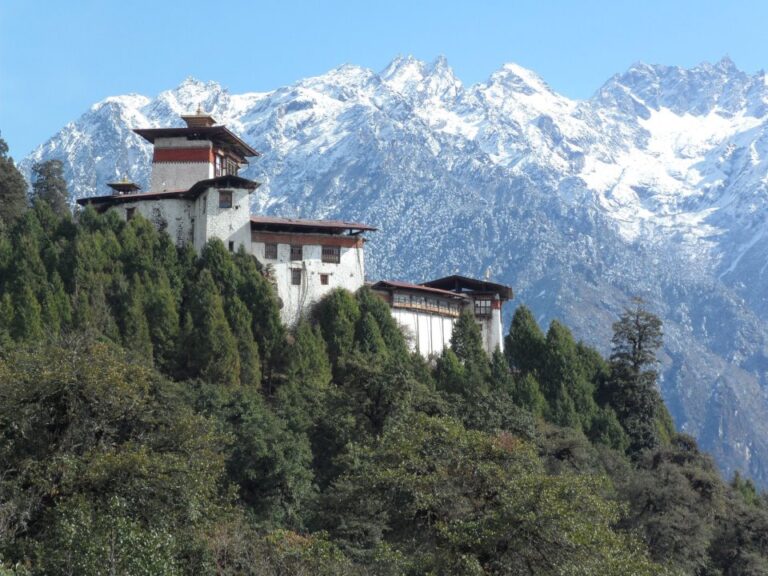
Day 1 – Arrival in Paro (2,200m / 7,218ft) and Drive to Thimphu (2,320m / 7,610ft)
As your flight descends into Bhutan, prepare to be mesmerized by sweeping views of the Eastern Himalayas. On a clear day, you will witness towering giants like Mount Everest (8,848m / 29,029ft), Kanchenjunga (8,586m / 28,169ft), and Bhutan’s own sacred Mount Jomolhari (7,326m / 24,035ft). Few landings in the world are as dramatic as Paro’s, nestled in a narrow valley with lush terraced fields.
Upon arrival, your guide and driver will warmly welcome you. From Paro, embark on a scenic drive to Bhutan’s capital, Thimphu—just 55 km (34 miles), taking about 1.5 hours. The journey winds past rivers and pine forests, offering your first glimpse of Bhutan’s serene landscapes. Check into your hotel and take the evening at leisure, allowing yourself to acclimatize to the altitude.
DAY 2
Explore Thimphu
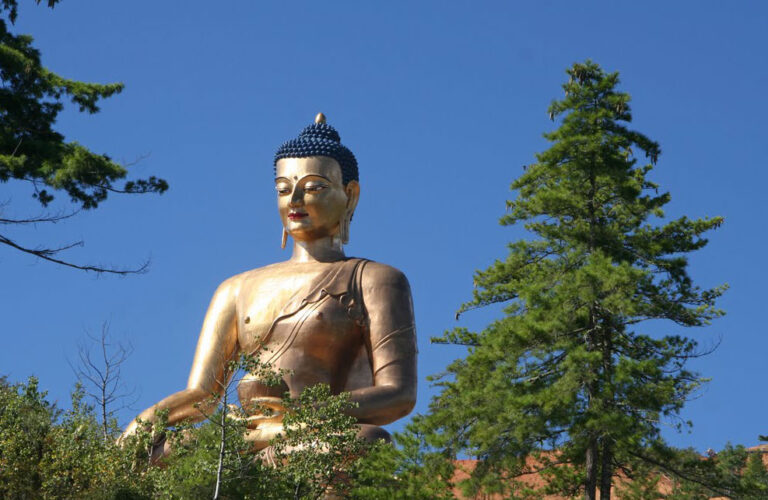
Day 2 – Exploring Thimphu, the Capital
Begin your day with a visit to the Buddha Dordenma, a towering golden statue that overlooks the valley, radiating peace. Continue to the Memorial Chorten, built in honor of the Third King, where locals gather in devotion.
For an immersive touch of Bhutanese culture, visit the Folk Heritage Museum, the Textile Museum, and the bustling Centenary Farmers Market. If time permits, enjoy a hike to the remote 17th century Buddhist Institute housed in Chari Monastery with a picnic lunch.
Evening strolls through Thimphu’s craft bazaar will give you the chance to see traditional artisans at work. Return to your hotel for dinner.
DAY 3
Punakha – the Ancient capital of Bhutan
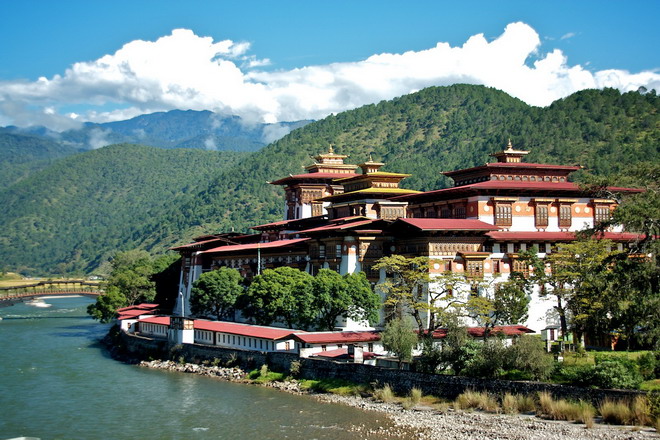
Thimphu to Punakha (1,200m / 3,937ft)
This morning, drive eastward toward Punakha. After about 45 minutes (22 km / 13.6 miles), you will reach the Dochula Pass (3,100m / 10,170ft). On a clear day, the pass unveils a breathtaking panoramic view of over a dozen Himalayan peaks, including Masagang (7,158m / 23,484ft), Gangkar Puensum (7,570m / 24,836ft)—the highest unclimbed mountain in the world—and other sacred peaks. The pass itself is adorned with 108 memorial chortens, prayer flags, and a serenity that inspires reflection.
From Dochula, descend into the subtropical Punakha Valley, a total drive of 77 km (48 miles) taking about 3 hours. In the afternoon, visit the Punakha Dzong, one of Bhutan’s most beautiful fortress-monasteries, strategically built at the confluence of the Pho Chhu (Male River) and Mo Chhu (Female River). Overnight in Punakha.
DAY 4
Explore and experience Punakha valley
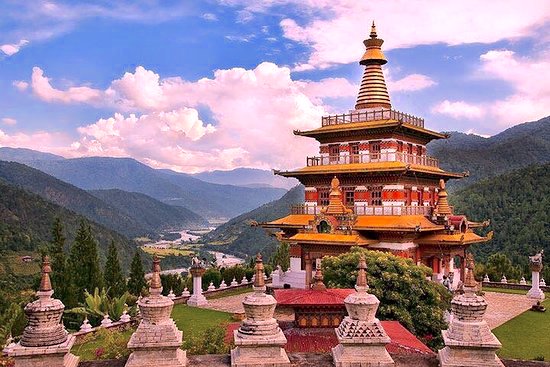
Start the day with a gentle hike through rice paddies and villages to the Khamsum Yulley Namgyal Chorten, a temple built by the Queen Mother to protect the kingdom. From its hilltop perch, enjoy sweeping views of the Punakha Valley.
Later, walk across one of Bhutan’s longest suspension bridges, spanning the Pho Chhu, and feel the thrill of fluttering prayer flags and rushing river currents below. If time permits, visit Chimi Lhakhang, the “Temple of Fertility,” revered by pilgrims from across Bhutan. Evening at leisure in the warm, lush Punakha Valley.
DAY 5
Journey back to Paro
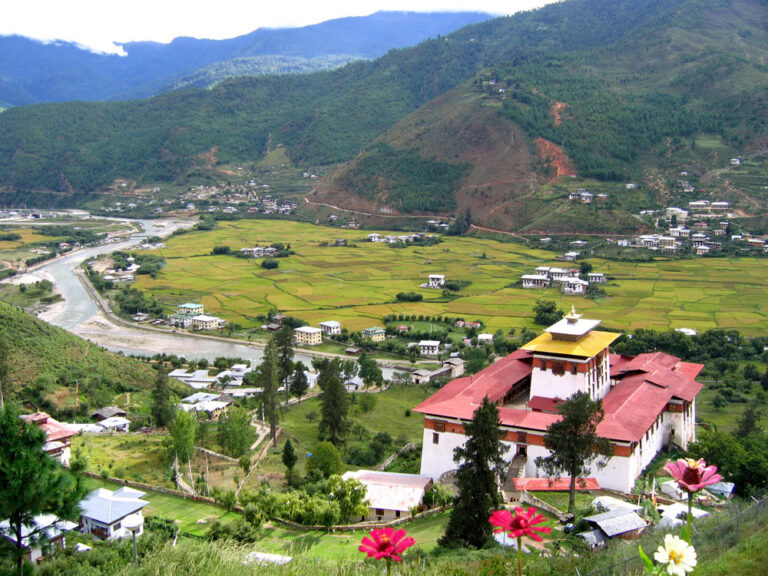
Punakha to Paro (2,200m / 7,218ft)
Retrace your journey westward, crossing back over Dochula Pass before descending once more into the Paro Valley. The drive covers about 125 km (78 miles) and takes around 4 hours.
In the afternoon, visit Kyichu Lhakhang, one of the oldest and most sacred temples in Bhutan, dating back to the 7th century. Later, visit the Paro Dzong where the moview “Little Buddha” was filmed and then walk down to explore the Paro Town, with its traditional shops and handicrafts. Overnight in Paro.
DAY 6
Paro Taktsang “Tigers Nest” hike – Excursion
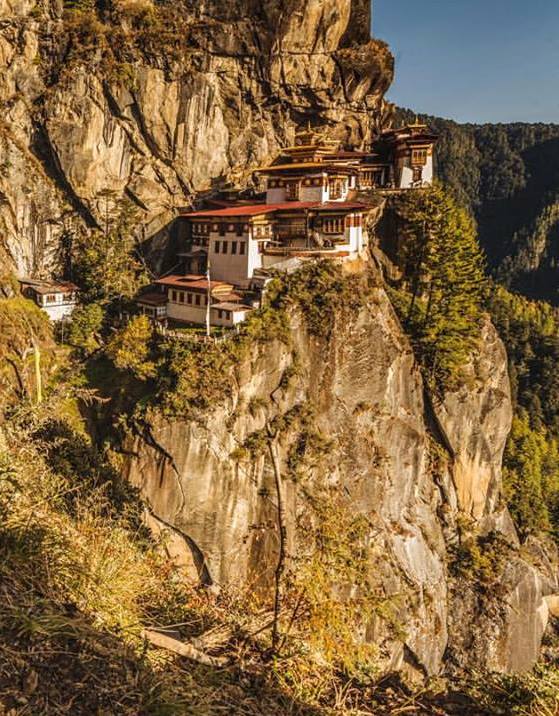
The Iconic Taktsang Monastery (3,120m / 10,240ft)
Today is the highlight of your journey: the hike to the legendary Taktsang Monastery (Tiger’s Nest), clinging dramatically to a sheer cliff at 900m (3,000ft) above the Paro Valley floor. The round-trip hike is about 6 km (3.7 miles) and takes 4–5 hours, depending on pace.
Along the trail, you will pass prayer wheels, forested slopes, and viewpoints offering spectacular photo opportunities. Once at the monastery, soak in the spiritual aura of one of the most sacred sites in the Buddhist world.
Return to Paro and enjoy a leisurely afternoon. In the evening, perhaps a cultural program of mask dances and folk songs awaits, celebrating Bhutan’s heritage followed by a farewell dinner with your guide and driver.
DAY 7
Depart Bhutan
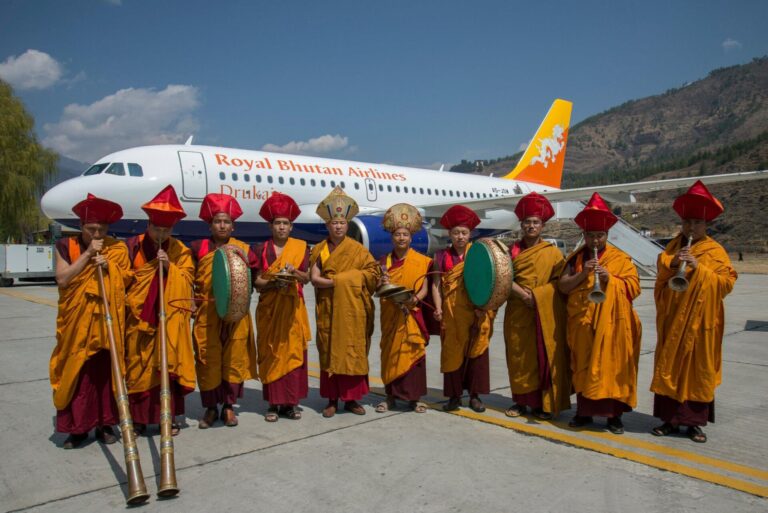
Departure from Bhutan
Your journey through the Kingdom of Bhutan comes to a heartfelt close. After breakfast, your guide and driver will accompany you to Paro International Airport, offering their final blessings and warm Tashi Delek (good wishes).
As your plane takes off, glance once more at the green valleys and towering Himalayan peaks—a reminder that Bhutan, with its compassionate people, timeless traditions, and philosophy of Gross National Happiness, will always welcome you back with open arms.
Enquire now
Ready to plan your journey? Whether you’re still deciding or ready to go, we’re here to help.
